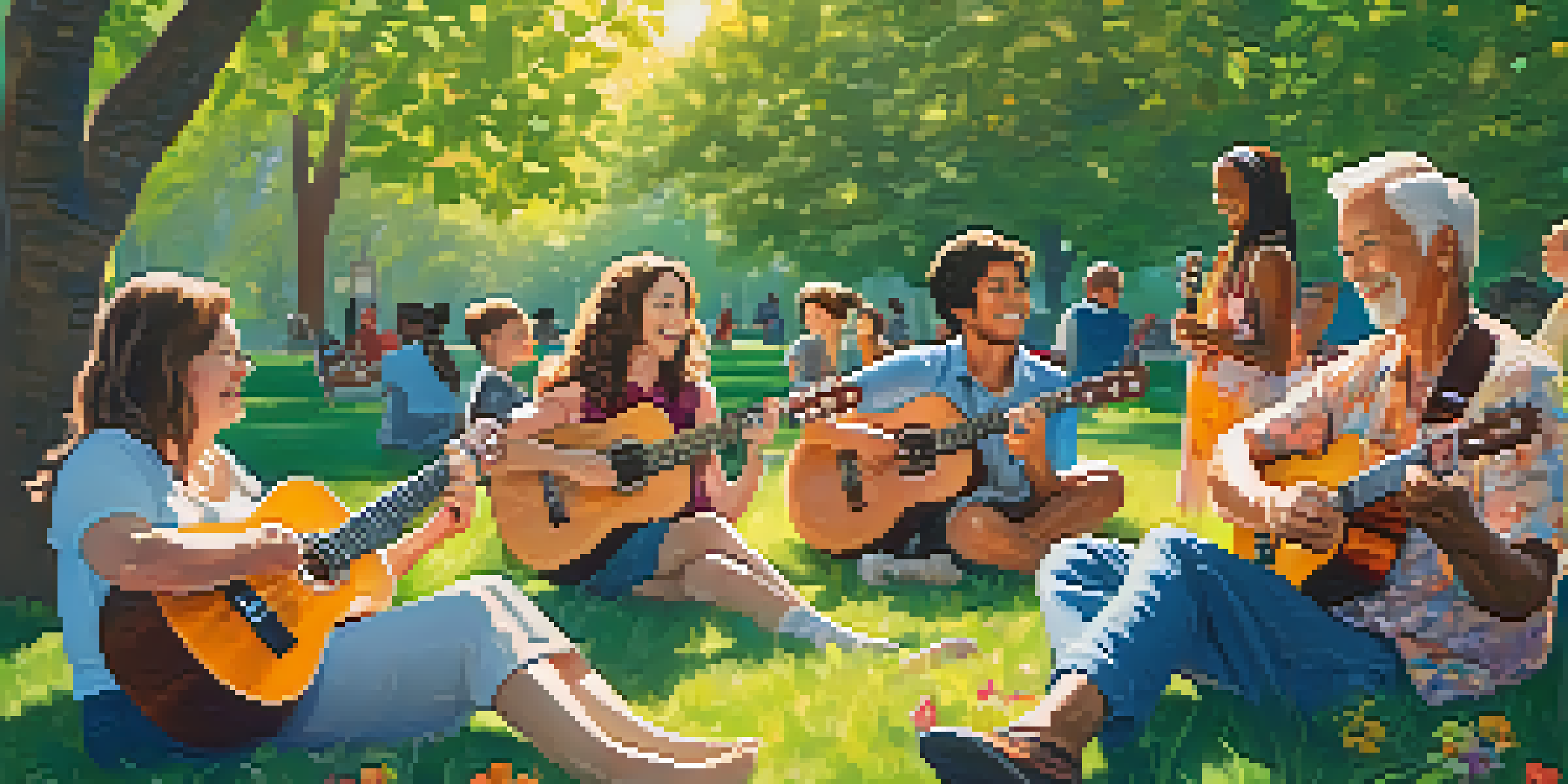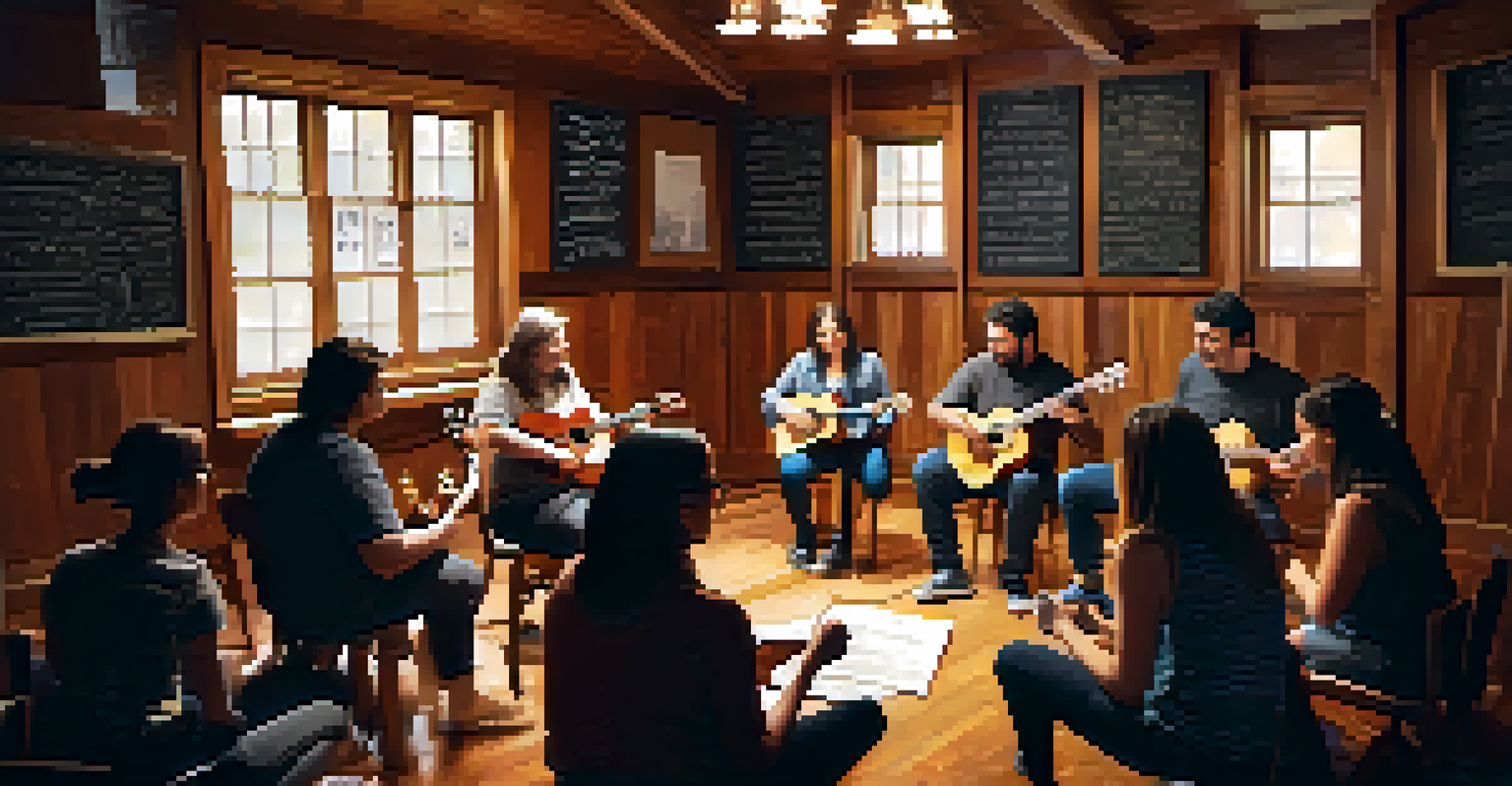Strumming for Change: Ukulele in 21st Century Activism

The Ukulele: A Brief History and Its Resurgence
The ukulele, often associated with Hawaiian music, has roots that trace back to the late 19th century. Originally brought to the islands by Portuguese immigrants, it quickly became a symbol of joy and community. In recent years, the ukulele has experienced a resurgence, capturing the hearts of musicians and activists alike, thanks to its affordability and accessibility.
Music can change the world because it can change people.
In a world where music can unite people across cultures, the ukulele stands out as an instrument that’s easy to learn and play. Many artists are now incorporating the ukulele into their performances, making it a popular choice for social gatherings and protests. This resurgence has led to a new generation of players who are using their skills to advocate for change.
The charm of the ukulele lies in its ability to evoke emotions and bring people together. Whether it's a beach bonfire or a community rally, the sound of strumming can create a sense of belonging. This musical instrument is not just an object; it’s a vehicle for messages of hope and activism.
Music as a Tool for Social Change
Music has long been a powerful medium for social change, serving as a rallying cry and a source of inspiration. The ukulele, with its cheerful sound, has found its place in this tradition, encouraging individuals to express their beliefs and stand up for causes. Songs can move hearts and minds, and when paired with the simplicity of the ukulele, they become even more accessible.

Activists across the globe have harnessed the ukulele to spread awareness on various issues, from climate change to social justice. For instance, groups have organized ukulele-led protests where participants strum along to songs that highlight their causes. This approach not only amplifies their message but also fosters a sense of community among participants.
Ukulele as a Symbol of Unity
The ukulele fosters community and activism, serving as a joyful instrument that brings people together for social causes.
In this digital age, music can travel far and wide, reaching audiences worldwide through platforms like social media. The ukulele has gained popularity in these spaces, with videos of activists strumming and singing going viral. This online presence helps to inspire others to join in the movement, creating a ripple effect of activism.
Strumming for Climate Action
One of the most pressing issues of our time is climate change, and musicians are using the ukulele to bring attention to this crisis. Events like 'Ukulele for the Planet' unite players in a collective effort to raise awareness, using music to educate the public. These gatherings often feature performances of original songs that speak to the urgency of environmental issues.
The power of music is a unique force that can unite communities and inspire change.
The ukulele's lighthearted nature contrasts with the serious topic of climate change, making it an approachable entry point for discussions. By using catchy melodies and relatable lyrics, musicians can engage audiences who might otherwise feel overwhelmed by the subject. This strategy allows for meaningful dialogues while keeping spirits high.
As more artists join the movement, the ukulele is becoming synonymous with climate activism. Songs about sustainability, conservation, and the beauty of nature resonate deeply with listeners, inspiring them to take action in their own lives. In this way, the ukulele is not just an instrument; it's a catalyst for change.
Empowerment Through Songwriting
Songwriting is a powerful form of self-expression, and the ukulele provides a perfect canvas for budding songwriters. Many activists are penning their own songs that reflect their values and experiences, using the instrument to share personal stories. This process can be both therapeutic and empowering, as it allows individuals to voice their concerns and hopes.
Workshops and community gatherings centered around ukulele songwriting have emerged, fostering creativity and collaboration. These sessions often encourage participants to write about issues they care about, from mental health to racial equality. The resulting songs become anthems for change, resonating with others who share similar struggles.
Music Drives Social Change
Activists leverage the ukulele's cheerful sound to raise awareness and inspire action on pressing issues like climate change and social justice.
As these original compositions gain traction, they help amplify voices that may otherwise go unheard. The ukulele becomes more than just an instrument; it transforms into a tool for storytelling and advocacy. In this way, songwriting serves as a bridge connecting personal experiences to broader social movements.
Creating Safe Spaces for Dialogue
Music has the unique ability to create safe spaces where individuals can come together to share and discuss important topics. Ukulele circles—informal gatherings where people play and sing together—can provide a nurturing environment for discussions about social issues. These sessions encourage participants to express themselves freely while fostering a sense of community.
In many cases, these gatherings focus on themes of inclusivity and understanding. Participants are often encouraged to share their thoughts and experiences, leading to open and honest dialogues. The relaxed atmosphere created by the ukulele helps to break down barriers, allowing for deeper connections among individuals from diverse backgrounds.
The impact of these safe spaces can be profound, as they empower individuals to advocate for their beliefs. By strumming together, participants not only enjoy music but also build relationships that can lead to collaborative activism. The ukulele thus becomes a symbol of unity, reminding us that we’re stronger together.
The Role of Online Communities
The rise of social media has transformed how activists connect and collaborate, with online platforms playing a crucial role in the ukulele movement. Virtual ukulele groups have sprung up, allowing individuals to share their music, experiences, and activism efforts. These communities create a sense of belonging, bridging gaps between people who might never meet in person.
In these online spaces, musicians can share tutorials, cover songs, and original works that highlight social issues. The sharing of resources fosters a culture of learning and support, helping individuals to grow both musically and as activists. This connectivity leads to a vibrant exchange of ideas, encouraging creativity and innovation.
Empowerment Through Songwriting
Songwriting with the ukulele enables individuals to express their values and experiences, creating anthems for change and personal empowerment.
The impact of these online communities extends beyond music; they inspire real-world action. Many participants take their newfound skills and motivation into their local communities, organizing events and protests. The ukulele thus serves as a shared language for activists, creating a global network united by a common purpose.
The Future of Ukulele Activism
As the world continues to face complex challenges, the ukulele's role in activism is likely to grow. Its accessibility and infectious joy make it an ideal instrument for rallying people around important causes. Musicians are increasingly recognizing the power of their music to inspire change and mobilize communities.
The future may see more collaborative projects that blend music with activism, such as benefit concerts and community initiatives. These events can raise funds for various causes while also spreading awareness through the universal language of music. The ukulele will undoubtedly play a significant role in these efforts, continuing to unite people in their fight for justice.

Ultimately, the ukulele symbolizes hope and resilience in an ever-changing world. As more individuals pick up this instrument and harness its power for activism, we can expect to see a flourishing community of musicians dedicated to making a difference. The strumming of ukuleles will echo far beyond the music itself, resonating with the heartbeats of change.